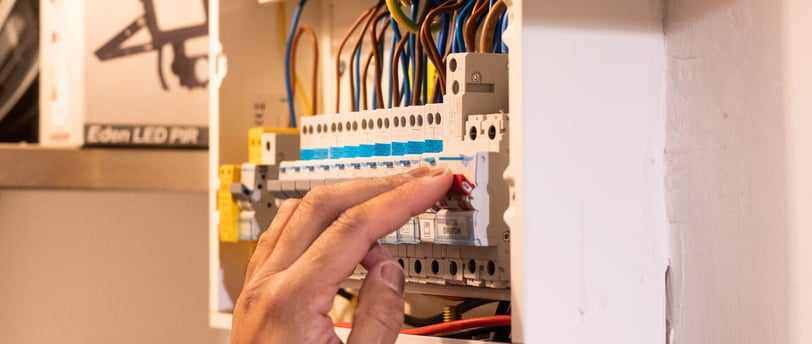All you ever wanted to know about fuse boards but were afraid to ask…
RCD or RCBO? Also what on earth is a SPD device. Why do you need them? What is their function anyway? Let’s check it all out!
Vishal Narbheram
1/24/20254 min read


All you ever wanted to know about fuse boards but were afraid to ask…
Are you annoyed by the continuous ‘tripping’ of your circuit breakers or fuses, leaving you with no electricity in your home? Do you dislike the moments of having to get a ladder, climbing it in the dark, and switching the circuit breaker on or rewiring a fuse? Well this might very well be the sign for an electrical refurbishment needed in your home. In this article, we are going to summarise what you need to know about fuseboards.
RCD or RCBO? Also what on earth is a SPD device. Why do you need them? What is their function anyway? Let’s check it all out!
Fuseboards (also known as consumer units)
More than 37,000 homes have fires that are started by an electrical incident in the UK every year. Yet, there are many homes that do not have the correct protective devices in them such as: using rewireable fuses or having a fuseboard that is protected by a wooden or plastic box. Current regulations state they should be metal as other forms will be documented as combustable materials. What does yours look like?
Electricity, as a form of energy, flows through your electrical system, it increases the temperature of the wires through the current (amps). In case of a system overload, the temperature rises so high that the wires catch fire, which is even more difficult to extinguish, as it is spreading in an invisible manner within the walls and you can not use water to extinguish the fire so then heavily reliant on the speed of the emergency services to save your home and loved ones.
How does a fuse or circuit breaker work? Electricity flowing between two conductors creates a magnetic field. When the amperage reaches a certain value (greater than that indicated on the fuse or circuit breaker), this increases the magnetic field and the electromagnet releases the latch, and the contact moves away from the stationary contact, causing the circuit to break. (This is when the fuse blows or circuit breaker trips)
If this keeps happening regularly, it indicates that you have a faulty circuit which would need to be assessed by a competent electrician before turning the fuse or circuit breaker back on. It is recommended that circuit breakers should only be allowed to be reset up to 5 times before it requires replacement.
RCD, RCBO, MCB and SPD devices
Although if you order a fuse board you will get its parts installed together, it still makes sense to understand how the whole system works.
MCB- A miniature circuit breaker is an electromechanical device which protects the circuit from an overload current or short circuit. Years back we used fuses for the same principle. It is really important to know that MCB’s do NOT protect humans from earth leakage.
Whats a short circuit? This is very dangerous and would indicate that the cable for that circuit has been damaged which could have be caused by a rodent chewing through it or hammering a nail to hang a picture on the wall.
Whats an overload current? This could mean there are too many appliances on that circuit such as using extension leads to power additional household accessories. This would cause over heating of the cables and become a fire hazard!
What is earth fault leakage? Earth fault is a fault between the live conductor and the earth. When earth fault occurs, the electrical system gets short-circuited and the short-circuited current flows through the system. The fault current returns through the earth or any electrical equipment, which damages the equipment. It also interrupts the continuity of the supply and may shock the user (this could be you). To protect the equipment and for the safety of people, fault protection devices are used in the installation.
What are RCD devices? A RCD, or residual current device, is a life-saving device which is designed to prevent you from getting a fatal electric shock if you touch something live, such as a bare wire. It can also provide some protection against electrical fires. RCDs offer a level of personal protection that ordinary fuses and circuit-breakers cannot provide. Research has found that RCDs are about 97% reliable. This improves if they are tested regularly. If you have RCD protection, it will reduce the risk of electric shock to you and your family. It can also protect your home against the risk of fire caused by faulty wiring or appliances.
What are RCBO devices? A RCBO is a combination of a MCB and RCD. You can have either a RCD with MCB fuseboard or a RCBO fuseboard.
Why do you need an SPD device? SPD’s also used to protect sensitive electronic equipment connected to the installation, such as computers, televisions, washing machines and safety circuits, such as fire detection systems and emergency lighting. Equipment with sensitive electronic circuitry can be vulnerable to damage by transient overvoltages. The effects of a surge can result in either instant failure or damage to the equipment only evident over a longer period of time. SPDs are usually installed within the consumer unit to protect the electrical installation but different types of SPD are available to protect the installation from other incoming services, such as telephone lines and cable TV. It is important to remember that protecting the electrical installation alone and not the other services could leave another route for transient voltages to enter the installation.
What are transient overvoltages? Man-made transients appear due to switching of motors and transformers, along with some types of lighting. Historically this has not been an issue within domestic installations but more recently, installations are changing with the advent of new technologies such as electric vehicle charging, air/ground source heat pumps and speed-controlled washing machines have made transients much more likely to occur within domestic installations. Natural transient overvoltages occur due to indirect lightning strikes most likely to happen due to a direct lightning strike on an adjacent overhead power or telephone line causing the transient overvoltage to travel along the lines, which can cause significant damage to the electrical installation and associated equipment.
Do you need these devices?
Absolutely, definitely, 100% yes! They protect your life against electrical fires and other related issues. Check the fuseboard installed at your home… is it an old device, wooden or plastic box? Fuses? No RCD or RCBO protection? Then we suggest having it checked, and if possible, changed to a modern one as soon as possible. In case you are planning a refurbishment, take the time to carefully plan ahead. What electrical requirements will be held against your system in the future such as electric vehicle charging point? Garage/shed power? Electric showers? High power oven or hob? The list goes on with technology booming!
Trust us, it is worth it!
If you ever need mental health support feel free to reach out to Onward Shift
Quick Links
At Ohm Sweet Ohm Electrical Services, we’re dedicated to delivering exceptional electrical solutions with a personal touch. Based in Colchester and serving Essex, we combine 15 years of expertise with a passion for creating spaces you’ll love. Whether it’s a small fix or a large project, we’re here to make your ideas come to life.
© 2025 Ohm Sweet Ohm Electrical Services. All Rights Reserved. Company Number 16141635.
Terms and Conditions / Privacy Policy / Cookie Policy
Dedicated to Excellence
Get in Touch
Phone: 07342 676245


